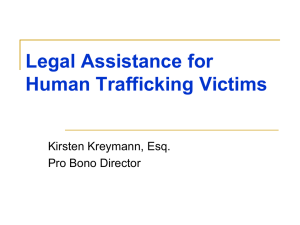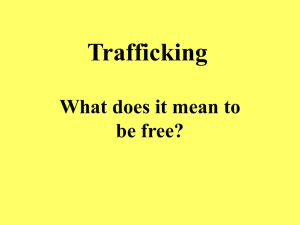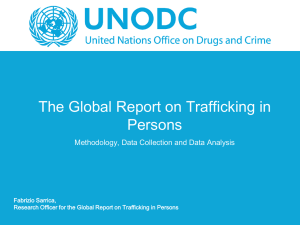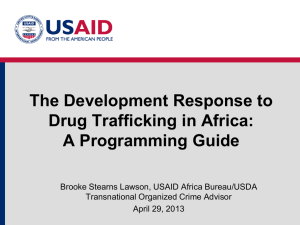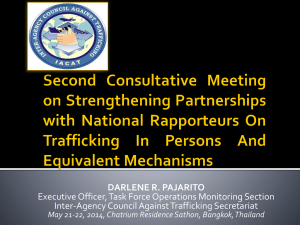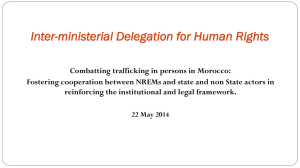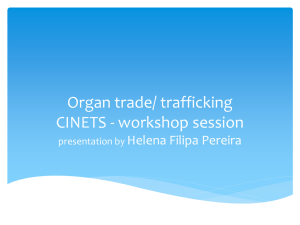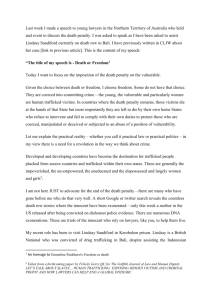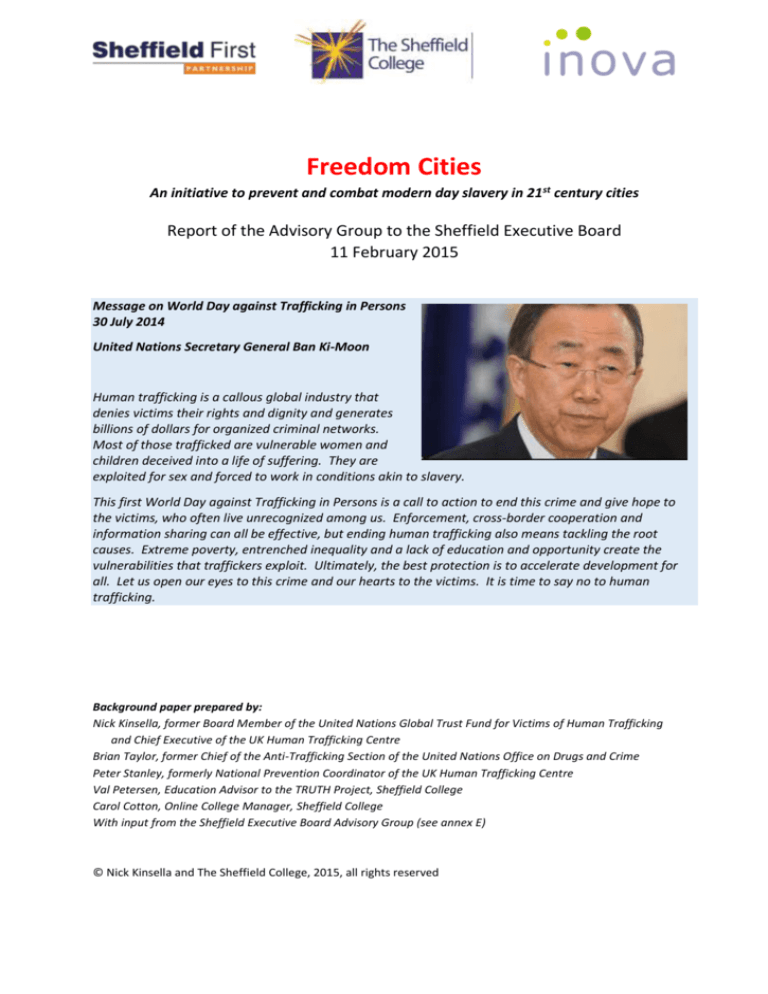
Freedom Cities
An initiative to prevent and combat modern day slavery in 21st century cities
Report of the Advisory Group to the Sheffield Executive Board
11 February 2015
Message on World Day against Trafficking in Persons
30 July 2014
United Nations Secretary General Ban Ki-Moon
Human trafficking is a callous global industry that
denies victims their rights and dignity and generates
billions of dollars for organized criminal networks.
Most of those trafficked are vulnerable women and
children deceived into a life of suffering. They are
exploited for sex and forced to work in conditions akin to slavery.
This first World Day against Trafficking in Persons is a call to action to end this crime and give hope to
the victims, who often live unrecognized among us. Enforcement, cross-border cooperation and
information sharing can all be effective, but ending human trafficking also means tackling the root
causes. Extreme poverty, entrenched inequality and a lack of education and opportunity create the
vulnerabilities that traffickers exploit. Ultimately, the best protection is to accelerate development for
all. Let us open our eyes to this crime and our hearts to the victims. It is time to say no to human
trafficking.
Background paper prepared by:
Nick Kinsella, former Board Member of the United Nations Global Trust Fund for Victims of Human Trafficking
and Chief Executive of the UK Human Trafficking Centre
Brian Taylor, former Chief of the Anti-Trafficking Section of the United Nations Office on Drugs and Crime
Peter Stanley, formerly National Prevention Coordinator of the UK Human Trafficking Centre
Val Petersen, Education Advisor to the TRUTH Project, Sheffield College
Carol Cotton, Online College Manager, Sheffield College
With input from the Sheffield Executive Board Advisory Group (see annex E)
© Nick Kinsella and The Sheffield College, 2015, all rights reserved
Executive Summary
Modern slavery offences are some of the most serious problems facing our globalised society. Some
200 years after the abolition of slavery in the British Empire and similar moves worldwide, modern
day slavery exists in many forms, perhaps the most prominent and well defined being human
trafficking. All nations and their citizens are affected by the consequences of this form of human
rights abuse. In recognition of the need for action, the Freedom Cities concept has been designed to
assist EU and other cities, in their efforts to tackle the problem, and with a planned pilot programme
taking place in Sheffield, UK.
The aim is to create an environment where cities are more effective in their planning and actions to
prevent and combat modern slavery/human trafficking and to provide appropriate support and
protection for the survivors.
By building upon existing structures, the Freedom Cities concept will develop and implement new
initiatives and standards against human trafficking that support both the EU anti-trafficking strategy
and United Nations’ conventions. For clarity of purpose and to aid effective monitoring and
evaluation, the term Human Trafficking will be used for identification and measurement, as it has
been well defined by the Palermo Protocol, whilst the wider realm of slavery will be included as the
overall scope of the initiative.
Freedom Cities aims to become Europe's leading anti-slavery campaign, promoting a slavery-free EU
in a network of cities1 and their local communities working together in an integrated, communitybased approach to prevent and counter human trafficking. It also has the potential to be replicated
in other regions as part of an eventual global programme.
It is proposed that the city of Sheffield explores funding opportunities, including with the EU to pilot
this initiative. Once Freedom City accreditation is awarded, it will remain in place for a period of
seven years. Renewal of accreditation would be subject to an evaluation/review of measures. This is
designed to ensure a sustainable, ongoing commitment to fighting human trafficking.
To be accredited for Freedom City status certain criteria have to be met. This includes a requirement
for cities to make modern slavery a strategic priority. The initiative will lead to the introduction of a
range of practical and realistic measures under the umbrella of the “four Ps”:
1
To prevent and combat trafficking in persons, paying particular attention to women and children.
To protect and assist the victims of trafficking, paying full respect to their human rights.
To prosecute offenders.
To work in partnership with other agencies.
There are 69 cities in the UK and approximately 455 cities in the EU with populations over 100,000.
Freedom Cities - Confidential –Paper for Presentation to SEB
28 January 2015
© Nick Kinsella and The Sheffield College
2
Background and Context – The Problem
The challenges posed by human trafficking and other forms of modern slavery are immense. This
global phenomenon affects Member States, cities and local communities. Whilst it is a largely hidden
problem, it occurs on the streets of our towns and cities where people are trafficked and exploited
for sexual and labour purposes. It is present in all our communities with victims coming from all
countries, including from within the UK. It is noteworthy that the first conviction for human
trafficking in the UK took place in Sheffield in 2005, the city identified to pilot this initiative.
The UK Modern Slavery Strategy shows that the scale of the problem is significant with an estimated
10,000 to 13,000 potential victims in the UK during 2013. In recent years there have been year-onyear increases in the number of victims identified, yet although the problem continues to grow, it is
likely that the relatively low number of recovered victims in the UK is “just the tip of the iceberg”
which masks a far greater problem.
Given the scale and nature of the problem, the adoption of the Freedom Cities concept will lead to
the introduction of a range of practical measures to combat all forms of modern slavery and provide
the necessary support for victims. It is proposed that modern day slavery should be made a strategic
priority for the participating city and action taken to improve the knowledge and understanding of
human trafficking with a view to contributing towards a wider anti-trafficking response locally,
regionally, nationally and internationally.
By enlarging, where appropriate, multi-disciplinary partnerships to facilitate dialogue and
cooperation between public authorities, non-government organisations (NGOs), trade unions,
businesses and other relevant city institutions, greater assistance will be delivered in the
identification of trafficked persons and the advancement of the protection of the rights of potential,
presumed and actual victims of human trafficking.
Overall Objective
Through the promotion and delivery of a range of coordinated activities in an inter-agency/inter-city
approach, create an environment where cities are more effective in their actions to prevent and
combat modern slavery/human trafficking and to provide appropriate support and protection for the
survivors.
Freedom Cities - Confidential –Paper for Presentation to SEB
28 January 2015
© Nick Kinsella and The Sheffield College
3
Proposed Criteria for Accreditation as a Freedom City
The following criteria will be required:
a.
b.
Evidenced implementation of a minimum level of criteria at the application stage
Commitment to a formal plan for implementation of all the criteria within a three year
timeframe.
1. Prevention Criteria. The accredited city will:
1.1 Identify and ensure safeguarding of particularly vulnerable individuals and communities.
1.2 Take action to ensure its population know and understand what human trafficking is so that
individuals are able to recognise issues and respond appropriately. (People must know what
to do and/or where to go if they have a concern.)
1.3 Have in place a focal point of reference, a point of contact or centre of expertise/advice,
some method and arrangement for organising a proper response, recording and collating
data.
1.4 Publicly identify the demand factors generated by the city’s population that may cause
human trafficking.
1.5 Be able to demonstrate and evidence the city’s commitment to delivering a programme of
training and awareness raising among relevant organisations, agencies and communities
(public authorities, voluntary agencies, universities/colleges/schools, businesses, community
organisations) through:
1.5.1 Targeted technical training for frontline professionals, eg, law enforcement, health
services.
1.5.2 The production and distribution of publicity materials (regularly refreshed over time,
ie, not just a one-off ‘hit’).
1.5.3 Proactive use of media in all its forms including social media.
1.5.4 Support and delivery of conference(s), courses, training events and seminars.
1.5.5 Regular re-enforcement of key messages.
1.5.6 Taking the lead in their area, county or region by engaging with neighbouring towns
and communities, including the possible development of a Regional Anti-Trafficking
team (RAT).
1.5.7 Focused awareness raising to vulnerable communities (eg, minority ethnic groups, the
homeless) and schools (especially in relation to ‘grooming’ and missing children).
1.5.8 Support of the EU and Global Anti-Human Trafficking Day.
Freedom Cities - Confidential –Paper for Presentation to SEB
28 January 2015
© Nick Kinsella and The Sheffield College
4
2. Protection Criteria. The accredited city will:
2.1 Take steps to identify the scale and nature of the problem through a city-wide assessment of
the situation to establish a baseline.
2.2 Take steps to better identify victims and survivors, and be able to demonstrate and describe
a commitment to delivering timely interventions and access to:
2.2.1
2.2.2
2.2.3
2.2.4
2.2.5
2.2.6
2.2.7
2.2.8
An allocated support worker – key worker.
Health services – physical, emotional, psychological.
Housing (subject to 2.3 below).
Employment services.
Legal advice.
Translation services.
Repatriation programmes – reconnection with original family, community, networks.
Strategies for keeping themselves safe in future and protecting them from being retrafficked.
2.3 Work with partners to explore new and innovative solutions to enable practical steps to be
taken to provide safe accommodation to victims of human trafficking who are not eligible
for Housing Benefit or other state benefits (eg, EU citizens).
2.4 Improve multi-agency working across all sectors to better identify and protect victims of
trafficking, and record work with victims of human trafficking and share statistical data.
3. Prosecution Criteria. The accredited city will:
3.1 Work with the Police Service, other law enforcement agencies and their partners to ensure
the best possible response to this type of criminality. This will include:
3.1.1 Identifying the response to all forms of modern slavery as a priority for the city.
3.1.2 Ensuring (in accordance with law) effective information and intelligence sharing.
3.1.3 Ensuring effective training is delivered to key frontline staff who may come into
contact with a victim (as identified in EU Directive 2011/36/EU).
3.2 With partners, promote the use of financial investigations linked with human trafficking
related offences; enhancing the capacities, where possible, for tracing, freezing and
confiscating the instrumentalities and proceeds of human trafficking.
3.3 With partners, apply to use (in accordance with national law) confiscated proceeds of crime
to fund anti-trafficking initiatives and victim support, including the possibility of obtaining
compensation.
Freedom Cities - Confidential –Paper for Presentation to SEB
28 January 2015
© Nick Kinsella and The Sheffield College
5
3.4 Support the inclusion of human trafficking and modern slavery in Strategic Policing Plans to
highlight and focus resources on the issue.
3.5 Encourage the bodies responsible for oversight of the police and other public sector
organisations to hold them accountable for their response to human trafficking and modern
slavery.
4. Partnership Criteria. The accredited city will:
4.1 Recognise and acknowledge that whilst there is a national responsibility to combat and
prevent human trafficking, the link of this phenomenon to transnational organised crime
requires cooperation at the regional and city level, involving the private sector and relevant
NGOs.
4.2 The city network will build on lessons learnt and will work with all the relevant agencies to
avoid duplication, identify gaps and emerging issues and work together to tackle them. It
will do so through a range of actions to:
4.2.1
4.2.2
4.2.3
4.2.4
4.2.5
Address demand for trafficking.
Ensure that trafficked people know how they can seek and access support.
Ensure that those who may come across trafficking are able to respond.
Raise awareness of the dangers of trafficking.
Improve local support in the criminal justice sector for victims and witnesses of
trafficking.
4.3 Strengthen existing links and develop new city-wide partnerships across all sectors of the
community, eg, public/private sector partnerships.
4.4 Establish a city multi-agency anti-trafficking team and link closely to a wider network that
covers the region.
4.5 Engage constructively with the media in all its forms (eg, television, media, press, internet,
social media, professional publications) in all campaigns.
4.6 Utilise sporting and cultural links to carry the message to the community.
4.7 Encourage businesses to work together in adopting common anti-trafficking measures.
Freedom Cities - Confidential –Paper for Presentation to SEB
28 January 2015
© Nick Kinsella and The Sheffield College
6
Methodology
For the purpose of the pilot, in order to measure cities against the criteria for accreditation, the
following is proposed:
1. A participating city will commit to meet the criteria via a formal implementation plan within a
three year timeframe. An initial certificate will be awarded to show that the city is a participant.
2. A period of time (up to three years) will be given to meet the criteria.
3. Progress will be monitored through self-assessment online questionnaires which will be available
on the Freedom Cities website.
4. A toolkit will be available on the website to provide advice and guidance.
5. A small working group will be established to coordinate the initiative. It will be responsible for
reviewing online questionnaires and providing advice and guidance to the participants.
6. After a period of up to three years, a formal assessment will be completed and, subject to
meeting the criteria, a certificate of compliance will be awarded.
7. The certificate of compliance will last for a period of seven years after which a city will have to
reapply.
On completion of the pilot the methodology will be subject to evaluation.
Potential Benefits for Sheffield resulting from the Freedom Cities Initiative
1. By creating and pioneering an alliance of organisations within the city in a dynamic partnership
approach, Sheffield will be in the vanguard of the development and advancement of a network of
cities against trafficking, whilst also displaying the level of commitment needed to tackle the
problem effectively.
2. By being in the forefront of a Freedom Cities campaign which addresses the misery of human
trafficking, the humanitarian profile and status of Sheffield will be raised in a positive way,
nationally and internationally.
3. By strengthening action and taking a coordinated approach to tackle human trafficking, Sheffield’s
historic reputation as a safe city will be further enhanced. Moreover it will highlight the value
placed on protecting those who live and work in the city, especially the more vulnerable members
of society.
4. By adopting measures to prevent and counter human trafficking and making the issue a strategic
priority, Sheffield will continue to be seen as a safe and attractive city within which to live and
Freedom Cities - Confidential –Paper for Presentation to SEB
28 January 2015
© Nick Kinsella and The Sheffield College
7
conduct business. Furthermore, this will have a positive impact in helping to deter organised
crime groups from operating in the city.
5. By piloting the Freedom Cities concept, Sheffield will be well prepared to address any issues
arising from new legislation in the form of the Modern Slavery Bill, currently under consideration
by the UK parliament.
Next Steps
Discussions have taken place with the United Nations Office on Drugs and Crime (UNODC), the
organisation that leads global efforts to prevent and counter human trafficking and modern day
slavery. A positive response has been received. The UNODC welcomed details of the initiative and is
currently considering how Freedom Cities can complement and strengthen their existing efforts.
Should the UNODC become involved in the Freedom Cities campaign, it will further raise the
international profile of the city of Sheffield and continue its rich tradition in the anti-slavery
movement.
The Sheffield Executive Board is asked to:
1. Adopt the proposal for a pilot programme in Sheffield and direct that a bid for EU funding for a
pilot be completed and submitted by 31 March 2015.2
2. Explore other potential sources of funding.
3. Determine activities within the Freedom Cities concept that can be delivered within existing
budgets or at little or no cost.
Further information about the initiative can be found in annexes.
2
Annex A – Potential Outcomes of the Freedom Cities Initiative
Annex B – Practical Anticipated Outputs under the Auspices of the 4P Approach
Annex C – Issues to be Addressed in the Development of Freedom Cities
Annex D – Modern Slavery and Human Trafficking – Key Facts
Annex E – Members of Sheffield Executive Board Advisory Group
Annex F – Organisations which support the Freedom Cities Initiative
An EU-funding requirement may be the involvement of three European cities. Initial approaches have been made to Dublin
and Bologna.
Freedom Cities - Confidential –Paper for Presentation to SEB
28 January 2015
© Nick Kinsella and The Sheffield College
8
ANNEX A
Potential Outcomes of the Freedom Cities Initiative
Freedom Cities will work to build upon existing structures, develop and implement new initiatives
and standards against human trafficking that support both the UK Modern Slavery Strategy, the EU
anti-trafficking strategy and United Nations’ conventions. Potential outcomes of the initiative
include:
1. A more effective strategic response will be developed and implemented which will build upon
current anti-trafficking approaches and complement national strategies.
2. Links and new partnerships will be established across a broad range of organisations with a
common aim of combating human trafficking and other modern slavery crimes.
3. In the framework of our inter-connected world, the networking of initiatives, programmes and
projects will be facilitated, together with the identification and promotion of good practice in a
Freedom City network across the EU.
4. Public awareness of the problem will be increased which in turn will lead to greater identification
of victims.
5. The purchasing patterns of consumers within the city will be highlighted where they are
instrumental in creating demand for human trafficking. This will include direct purchases and also
supply chains and lead to a reduction in demand generation.
6. Greater practical support will be provided to vulnerable individuals and communities.
7. Training capacity will be enhanced via training of trainers. Improved training will result in better
awareness of First Responders such as police, social services, medical staff and education officials.
This will lead to more effective identification and protection of victims, enhanced investigation
and more successful prosecutions of offenders.
8. An effective media and awareness campaign will be launched. Events will be arranged for the
annual World Day against Trafficking in Persons (30 July 2015) and Anti-Slavery Day (18 October
2015).
9. A Freedom Cities website will be established to provide detailed information and action being
taken.
Freedom Cities - Confidential –Paper for Presentation to SEB
28 January 2015
© Nick Kinsella and The Sheffield College
9
ANNEX B
Practical Anticipated Outputs under the Auspices of the 4P Approach
Prevention
‘Prevention is better than cure so high profile public awareness campaigns and internal police
awareness and training campaigns should be at the heart of our strategic response to modern slavery’.
Rob Wainwright, Director of Europol, London, 25 November 2014
1. Training and Awareness
Awareness campaigns should be an integral part of a major, sustainable and long-term strategy
designed to raise awareness about human trafficking and be coordinated between groups to ensure
the greatest possible impact. Campaigns should include, inter alia, information on human trafficking,
UK law, indicators of trafficking, demand factors and how to seek support. The campaign should be
developed with input from affected communities, including trafficked persons, migrant workers,
unions and relevant labour sectors, sex workers and others. Specific action will include:
1.1
Promoting targeted awareness-raising and public education in order to ensure respect for the
human rights and fundamental freedoms of persons vulnerable to human trafficking. Efforts
to address human trafficking should be holistic and efforts should address demand as well as
raise awareness among the public about human trafficking and raise awareness among
potential victims of the dangers of human trafficking.
1.2
Expansion of existing online human trafficking training (developed by the Sheffield College) to
ensure a greater take-up by all areas of the community. A basic online course should be made
available for the general public free of charge.
1.3
Explore opportunities to enhance and expand training for personnel in specific sectors that
may come into contact with victims, eg, taxi drivers, club owners.
1.4
Develop specific training for foster carers and/or managers of social services accommodation
concerning children who are at a significant risk of going missing.
1.5
Intensify training for specific categories of professionals who are likely to be involved in
considering or making decisions about trafficked victims.
1.6
Promoting regular training courses, as appropriate, for frontline workers (eg, health, social
services, education, police and prosecution authority).
1.7
Training staff to create a cadre of trainers who can deliver training in their own organisations.
1.8
Encouraging the development and introduction of training programmes on human trafficking
related issues for social workers, labour inspectors and other public service providers.
Freedom Cities - Confidential –Paper for Presentation to SEB
28 January 2015
© Nick Kinsella and The Sheffield College
10
1.9
Awareness raising measures for media professionals, including modules on the use of nondiscriminatory language, countering stereotypes and understanding the impact news reports
have on victims when covering human trafficking issues.
1.10 Training for medical professionals and social welfare services aimed at assisting victims of
trafficking, as well as on the ethical principles related to organ transplantation, trafficking
victim identification and trauma suffered by victims.
1.11 Appropriate training will also be developed to target personnel of the tourism and hospitality
industry, human resources personnel working in private sector companies and staff working in
the transportation sector, including bus, tram and train. This will be aimed at assisting in the
identification of trafficked persons as well as the introduction of measures to prevent human
trafficking.
1.12 Schools within the city to be encouraged to become an Anti-Slavery School and qualify for
UNESCO UK Associated Schools status.
2. Other Prevention Measures
2.1 Strengthening efforts to address the root causes of all forms of human trafficking.
2.2 Promoting the development and implementation of codes of conduct by the private sector,
trade unions and relevant civil society institutions to ensure the protection of the human rights
and fundamental freedoms of workers throughout the supply chain in order to prevent the
exploitative situations that foster trafficking.
2.3 Encouraging accessible complaint mechanisms and relevant information for workers to enable
them to notify the authorities of abusive practices that foster human trafficking, and taking
measures to prevent such abuses.
2.4 Promoting measures to prevent trafficking for domestic servitude to protect domestic workers
and inform them of their rights as employees and how to report abuses.
2.5 Developing and implementing policies and actions, including law enforcement cooperation, to
prevent the tourism industry from being used for all forms of human trafficking, in particular for
sexual exploitation of children.
2.6 Promoting policies to raise awareness of human trafficking, including through developing
partnerships with health care and medical professionals, with associations in the medical
profession, with transplant organisations and with relevant NGOs, where necessary, and other
relevant mechanisms. As appropriate, developing in this regard partnerships with transplant
organisations to promote legal organ donation methods/channels.
Freedom Cities - Confidential –Paper for Presentation to SEB
28 January 2015
© Nick Kinsella and The Sheffield College
11
2.7 Efforts to address human trafficking should be holistic and should address demand as well as
raise awareness amongst the public about trafficking and raise awareness among potential
victims of the dangers of trafficking.
2.8 Developing a ‘partnership’ and encouraging a proactive role with the media.
2.9 Special attention should be paid to children in child institutions/orphanages, children in
alternative care, runaway youth, unaccompanied and separated children, children with
disabilities, children belonging to national minorities, children without any citizenship, children
without birth registration, child asylum-seekers, refugees and internally displaced persons, and
children left behind by migrating parents. Ensuring that all child victims of human trafficking are
provided with access to justice and remedies, including the possibility of obtaining
compensation, ensuring the protection of children’s rights, promoting access to education and
health care for vulnerable children, and developing and implementing appropriate programmes
and measures taking into consideration the best interest of the child.
Protection
‘An open wound on the body of contemporary society; a crime against humanity.’
Pope Francis describing human trafficking at the launch of the Santa Marta Group in April 2014
1.
Proactively seeking out, identifying and supporting victims by a range of measures (eg, screening
vulnerable populations, visiting locations and high-risk sectors where exploitation may be taking
place – agriculture, hospitality, construction, retail, etc).
2.
To develop and promote guidance for First Responders on how to identify and refer victims.
3.
Issue a reminder to First Responders and Competent Authorities that under 18s are entitled to
special measures to protect them.
4.
Introduce coordinated referral systems for trafficked persons at local level.
5.
The appointment of a specific point of coordination to address the issues of missing children and
child trafficking within each local authority.
6.
In Freedom Cities, general medical practices should be designated to take trafficking survivors onto
their patients list regardless of whether they have identification or address history.
7.
Taking adequate measures to ensure that, where appropriate, identified victims of human
trafficking are not penalised for their involvement in unlawful activities to the extent that they have
been compelled to do so.
8.
Introduce measures to enhance data collection by frontline agencies to improve the quality of data
to develop a baseline/foundation to monitor the extent of human trafficking in the city.
Freedom Cities - Confidential –Paper for Presentation to SEB
28 January 2015
© Nick Kinsella and The Sheffield College
12
9.
Schools and colleges integrate lessons around grooming, exploitation and internet safety into
curriculum lessons to help protect young people and reduce their vulnerability to the crime.
10. Within child protection there is a designated trafficking liaison officer who has greater training in
the intricacies of working with child trafficking survivors (both national and international survivors).
11. Encouraging universities to conduct research and to include human trafficking in the curriculum.
12. To develop income generation and fund-raising schemes which also embrace local organisations
and institutions.
13. Integrating the valuable work of NGOs into a cohesive, city-wide approach.
14. Encouraging collaboration between the victim support network and the health services to provide a
better response to the health needs of survivors.
Prosecution
Officials likely to come into contact with victims or potential victims of trafficking in human beings
should be adequately trained to identify and deal with such victims… Police officers, border guards,
immigration officials, public prosecutors, lawyers, members of the judiciary and court officials, labour
inspectors, social, child and health care personnel and consular staff, but could, depending on local
circumstances, also involve other groups of public officials who are likely to encounter trafficking victims
in their work.
EU Directive 2011/36/EU on preventing and combating trafficking in human beings and protecting its
victims, April 2011
1.
Appropriate training will be developed and delivered to police, prosecutors (criminal and family
law) and courts/criminal justice workers. Potential partners include, eg, the National Law Society
and Prosecution Service.
2.
Measures will be taken to improve data collection to better understand the problem, to have a
baseline in which to monitor progress and performance, and assist the police in building the
intelligence picture.
3.
Adequate resources and capacities should be made available to pursue financial investigations in
human trafficking-related offences to trace, freeze and confiscate the proceeds of the crime.
4.
In order to fund anti-human trafficking initiatives and victim support schemes, application will be
made to use, in accordance with national law, the confiscated proceeds of crime. Moreover the
possibility of obtaining compensation for victims should be vigorously pursued during the
prosecution of offenders.
Freedom Cities - Confidential –Paper for Presentation to SEB
28 January 2015
© Nick Kinsella and The Sheffield College
13
5.
The body responsible for oversight of the police should hold the police force accountable for its
response to human trafficking and modern slavery in the force area. Human trafficking and
modern slavery should be included in Strategic Policing Plans to highlight the importance and focus
on the issue.
Partnerships
While the primary responsibility for combating and preventing human trafficking rests with the national
government, the link of this phenomenon to transnational organised crime requires co-operation at the
local, city and regional level, involving the public/private sector and relevant NGOs. The city network
aims to build on lessons learnt and will work with all the relevant agencies to avoid duplication, identify
gaps and emerging issues and work together to tackle them. It does this through a number of actions
including initiatives to:
1.
Address demand for trafficking.
2.
Ensure that trafficked people know how they can seek and access support.
3.
Ensure that those who may come across human trafficking are able to respond.
4.
Raise awareness of the dangers of human trafficking.
5.
Improve support in the criminal justice sector for victims and witnesses of human trafficking.
6.
Strengthening existing links and developing new city-wide partnerships across all sectors of the
community, eg, public/private sector partnerships.
7.
Constructive engagement of media, in all its forms (eg, television, media, press, internet, social
media, professional publication) in all campaigns.
8.
Sporting and cultural links to carry the message to the community.
9.
Businesses and the Chamber of Commerce work together to adopt common anti-human trafficking
measures.
10. Relevant professionals such as police, NGOs, health care, solicitors, etc, from a Freedom City would
have a presence at Regional Anti-Human Trafficking (RAT) network meetings to share best practice,
new trends and ways to develop better knowledge and services (this could also inform research
proposals).
Freedom Cities - Confidential –Paper for Presentation to SEB
28 January 2015
© Nick Kinsella and The Sheffield College
14
ANNEX C
Issues to be Addressed in the Development of Freedom Cities
1. Utilise existing EU instruments for combating human trafficking to create a national/EU/global
campaign3 whereby cities are recognised by the EU for their anti-trafficking work; thereby
establishing Freedom Cities as leading the European (and a potentially wider international
initiative) anti-human trafficking campaign. (Partnership)
increasing the awareness of EU citizens to support victims. (Protection)
creating practical, effective and sustainable structures that combat trafficking. (Prevention)
2. Establish that Freedom Cities share a common aim (mission statement) in identifying and combating
human trafficking and other modern slavery offences within their structures and communities,
delivering a practical and meaningful enhanced defence against what is a local as well as an
international crime.
3. Freedom Cities to establish a cooperative network of organisations (or enhance existing structures) to
further that aim and provide victims with support, hope and access to justice.
4. Establish a set of common criteria for a Freedom City.4
5. Whilst recognising that Freedom Cities have a common aim and criteria, Freedom Cities also
recognises that effective support to individual national strategies is important to build an effective
response to national, regional and local issues. This support will be delivered on a pro-active
collaborative basis.
6. Create a set of bespoke targets, prepared and agreed between EU and the city which may include, eg
key institutions cooperating in the campaign, eg, city administration, news media, university, law
enforcement, business organisations.
awareness of human trafficking and other modern slavery type offences included in training of
key staff, eg, education, law enforcement, social services, child protection.
an agreed fund-raising target to be set and funds distributed to local anti-trafficking charities.
7. A city-based campaign to raise awareness of human trafficking and modern slavery amongst the
general public and specific groups whilst coordinating fund-raising for local victim-support
organisations and enhancing anti-trafficking activity. ‘Local People, Local Action, Local Benefit.’
8. Establish Freedom City as a sought after ‘brand’ which, when achieved, is recognised by the EU
(perhaps by a goodwill ambassador) in a formal presentation that offers media opportunities.
9. Access to EU websites to publicise the initiative and the support given by/to the EU. Access to EU
regional offices to support the initiative.
3
4
This could be on an EU or a national basis but engagement of cities allows greater local involvement and superior fund-raising
opportunities in the current economic climate. A city campaign also sits comfortably with the concept of the EU being ‘people to
people.’
Much of the material to assist here already exists within the EU and elsewhere.
Freedom Cities - Confidential –Paper for Presentation to SEB
28 January 2015
© Nick Kinsella and The Sheffield College
15
ANNEX D
Modern Slavery and Human Trafficking – Key Facts
1.
Human trafficking is the abuse of a person’s human rights.
2.
Modern day slavery is a profitable criminal business estimated by the International Labour
Organisation (ILO) to be worth $150 billion per annum globally.
3.
Free the Slaves estimates 27 million people held in slavery globally. Estimated that there are
140,000 trafficked people in Europe with 2600 trafficked victims in the UK sex industry.
4.
Human Trafficking is present in all our communities. Victims come from all countries, including the
UK.
5.
Women and girls are the victims in 80% of human trafficking cases. The perpetrators are usually
male. Men and boys are less likely to report their exploitation; consequently many are undetected.
6.
People are trafficked into, eg, sexual exploitation, forced labour (construction, agriculture, textile
industry, catering), domestic servitude, cannabis production, organ harvesting.
7.
Human Trafficking isn’t an immigration issue; it is a crime against an individual, whereas people
smuggling is a crime against the State.
8.
Child trafficking worldwide accounts for 15% of victims. Child trafficking is a problem in the UK and
South Yorkshire. UK figures show over 25% of child victims are trafficked for sexual exploitation.
Children are also trafficked into domestic slavery, for benefit fraud, cannabis farming, street
begging, theft and shoplifting.
9.
Recovered victims may be "just the tip of the iceberg." UK figures: 50% of adult referrals are for
sexual exploitation, 30% for forced labour and 20% for domestic servitude. On average three
potential victims are referred to the UK’s National Referral Mechanism (NRM) every day.
10. In 2013, South Yorkshire Police referred six potential victims of human trafficking to the NRM
(other victims may have been referred by other agencies). Across the UK, 1746 referrals were
made to the NRM in 2013, a 47% increase on previous year.
11. Convictions for human trafficking are increasing globally. The UK's first conviction for human
trafficking was in Sheffield in 2005. The UK conviction rate where human trafficking is the principal
offence is around 25 per year.
12. A victim's life is marked by abuse and betrayal of basic human rights which can lead to depression,
despair, suicidal thoughts and attempts. Victims may believe themselves to be willing participants
and/or guilty of crimes. Victims are taught to distrust authority figures.
13. Under duress, victims can become perpetrators, recruiting and escorting others.
14. Perpetrators use a number of physical and psychological controls - imprisonment, isolation,
violence and the threat of violence, rape, fear, intimidation, deception, denial of food and water,
substance abuse, debt bondage, humiliation. If allowed out, victims are usually escorted.
15. Perpetrators may be in a relationship with victim, eg, parent/child, girl/"loverboy."
16. EU Directive 2011/36/EU calls for all frontline staff to receive human trafficking awareness training.
Freedom Cities - Confidential –Paper for Presentation to SEB
28 January 2015
© Nick Kinsella and The Sheffield College
16
ANNEX E
Members of Advisory Group to Sheffield Executive Board
Jen Baker, Anti-Trafficking Director, City Hearts
David Bowes, Executive Headteacher (representing Jayne Ludlum)
Bex Brady, Performance Officer, South Yorkshire Criminal Justice Board
Lara Bundock, Executive Director, Snowdrop Project
David Child, Member, Chamber of Commerce
Carol Cotton, Senior Administrator Online College, Sheffield College
Paul Harvey, Voluntary Action Sheffield
Graeme Hathaway, Director of Learning Innovation, Sheffield College
Christina Herbert, Lead Nurse Vulnerable Adults, Sheffield Teaching Hospitals
Kelly Jenkins, Equality and Inclusion Advisor, South Yorkshire Fire and Rescue
Nick Kinsella, Consultant and Specialist Advisor in Modern Slavery
Nicola Lamb, Chief Executive Officer, Ashiana
Marina Larios, Director, Inova Consultancy
Sue Mace, Lead for Children’s Safeguarding, National Health Service
Ellie Morrissey, Director, Hope Local
Trevor Owen, Head of Safeguarding Children’s Services, Sheffield City Council
Val Petersen, TRUTH Project Facilitator, Sheffield College (Chair)
Karen Sekula, Assistant Principal, Sheffield City College
Mark Smith, Operations Director, Safe at Last
Peter Stanley, Founder Member, Stop the Traffik
Jim Steinke, Chief Executive Officer, Northern Refuge Centre
Beth Stout, Chief Executive Officer, Golddigger Trust
Brian Taylor, Consultant to United Nations
Nitya Teagarajan, Inova Consultancy
Rachel Welton, Lead for Adult Safeguarding, National Health Service
Simon Wanless, Chief Inspector, South Yorkshire Police
In addition, the following people were circulated with information, kept informed of discussions and
given opportunity to contribute feedback:
Peter Bradley, Dean of Sheffield Cathedral
Tim Furness, Director of Business Planning and Partnerships, National Health Service
Jayne Ludlam, Interim Executive Director of Children, Young People and Families, SCC
Linda Mayhew, Business Manager, South Yorkshire Criminal Justice Board
Aiden McQuade, Director, Anti-Slavery International
Dawn Peet, Safeguarding Officer, South Yorkshire Fire and Rescue
Mick Quinn, Assistant Principal, Irish Department of Justice and Equality
Anne Read, National Coordinator of Victim Support Services, Salvation Army
Maxime Stavrianakos, Sheffield City Council Housing Department
Beth Stout, Chief Executive Officer, Golddigger Trust
Tony Strike, Director of Strategy, Planning and Change, Sheffield University
Freedom Cities - Confidential –Paper for Presentation to SEB
28 January 2015
© Nick Kinsella and The Sheffield College
17
ANNEX F
Organisations which Support the Freedom Cities Initiative5
Ian Atkinson, Chief Operating Officer, NHS Sheffield
Neill Birchenall, Managing Director, Birchenall Howden
Peter Bradley, Dean of Sheffield, The Cathedral Church of St Peter and St Paul
Heather Campbell, Professor of Town and Regional Planning, The University of Sheffield
Andrew Cash, Chief Executive, Sheffield Teaching Hospitals NHS Foundation Trust
James Courtney, Chief Fire Officer, South Yorkshire Fire and Rescue
David Crompton, Chief Constable, South Yorkshire Police
Julie Dore, Leader of the Council (Chair of SEB), Sheffield City Council
Deborah Egan, Director, The Electric Village, Sheffield City Region LEP Representative
Toby Hyam, Managing Director, Creative Space Management
Philip Jones, Vice-Chancellor, Sheffield Hallam University
Julie Lindsay, South Yorkshire District Manager, Jobcentre Plus
Heather MacDonald, Principal and Chief Executive, The Sheffield College
Sarah Mainwaring, Head of South Yorkshire NPS, National Probation Service
Debbie Matthews, Chief Executive, Manor and Castle Development Trust
Tim Moorhead, Chair of Sheffield NHS Clinical Commissioning Group Committee
John Mothersole, Chief Executive. Sheffield City Council
Mark Smith, Operations Director, Safe@Last
Sharon Squires, Director, Sheffield First
Ben Still, Interim Director General/Chief Executive, SYPTE/Sheffield City Region LEP
Sue White, Chief Executive, Voluntary Action Sheffield
Richard Wright, Executive Director, Sheffield Chamber of Commerce and Industry
5
members of Sheffield Executive Board
Freedom Cities - Confidential –Paper for Presentation to SEB
28 January 2015
© Nick Kinsella and The Sheffield College
18

